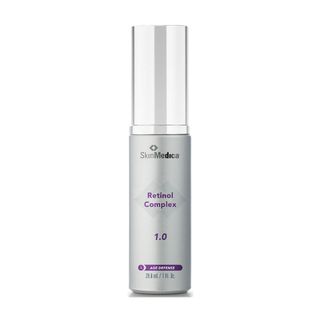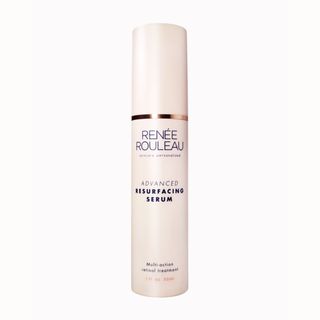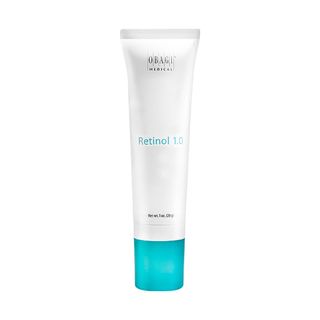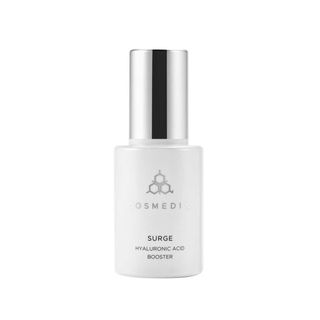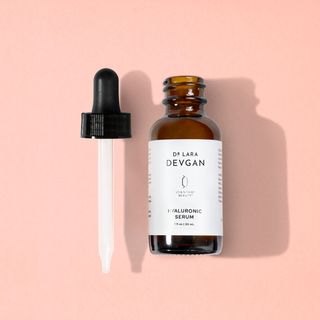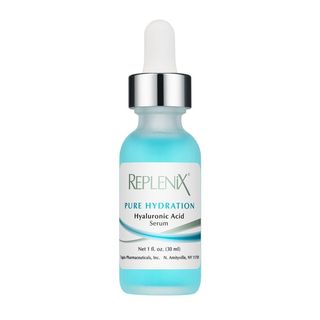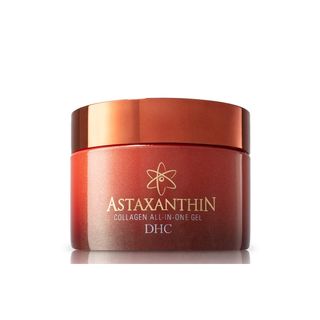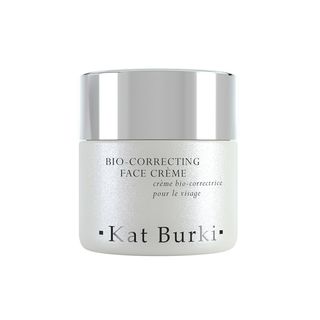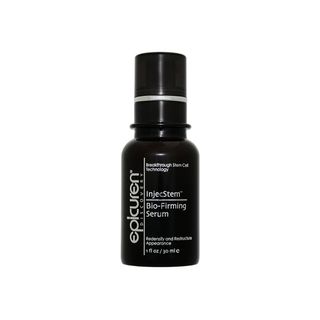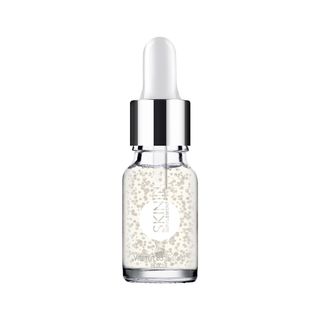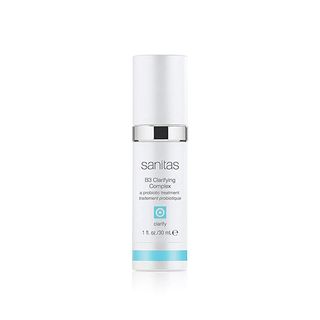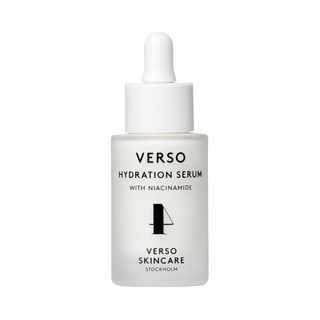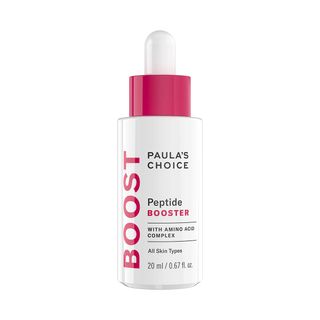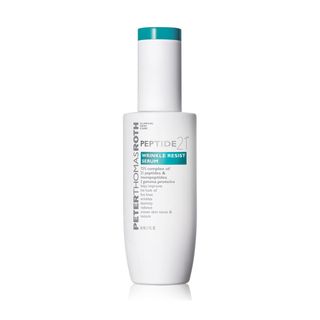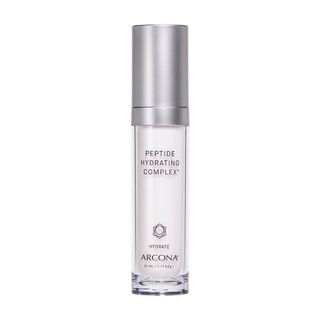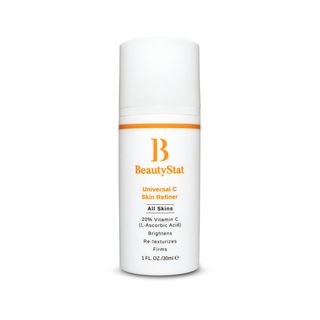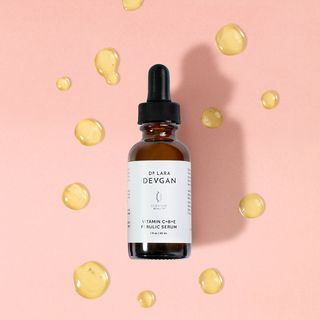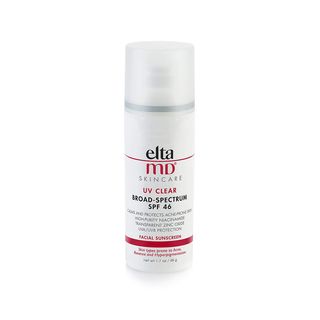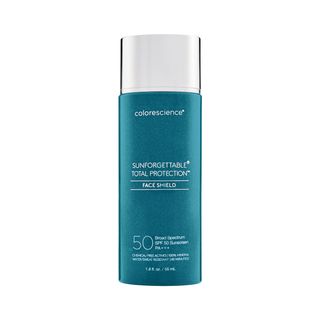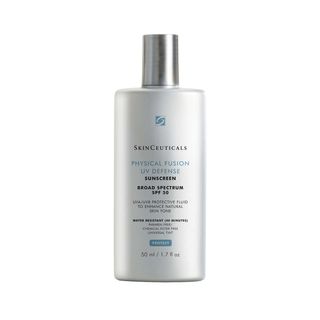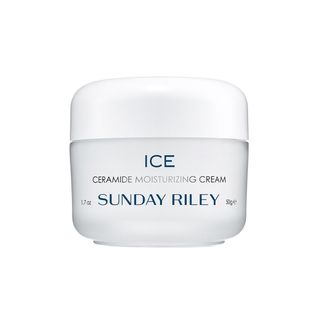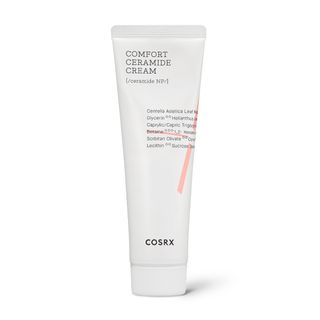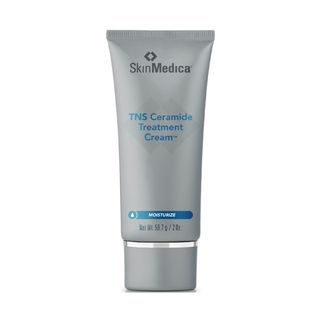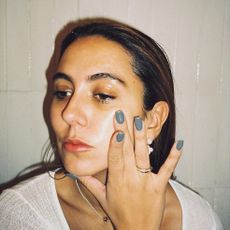The Best Youth-Enhancing Skin Regimens Include These 8 Strategic Ingredients
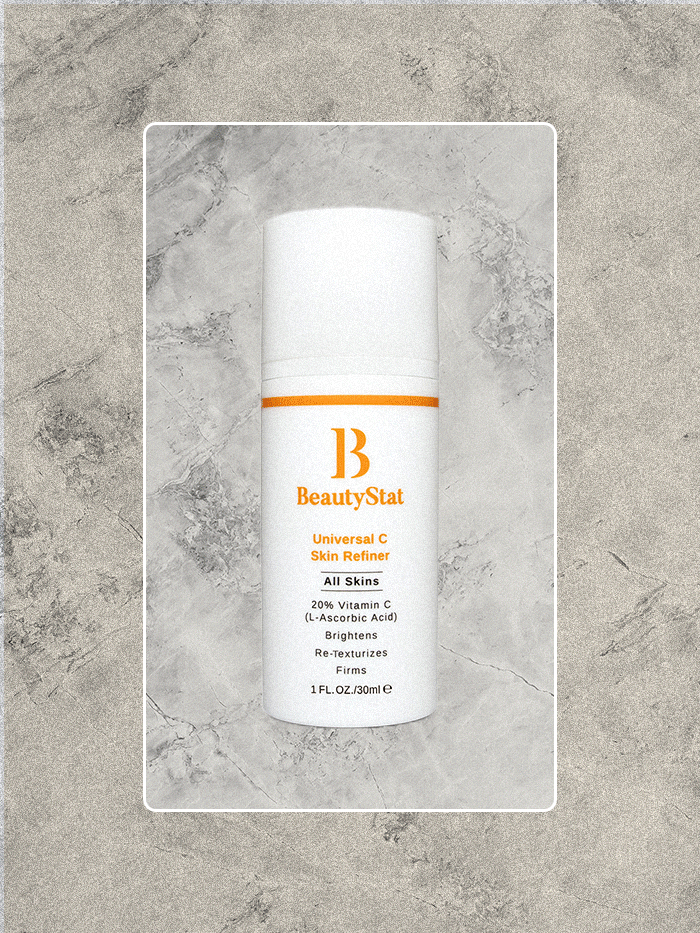
When it comes to aging, I'm definitely not an expert. I'm 27 with nary a line or wrinkle on my face, and while I harness a sponge-like talent for absorbing any and all skincare intel, (and I obviously proceed to share every single vetted tidbit I soak-up with you all!), I leave the serious advice to the experts—especially concerning topics like skincare chemistry or the most efficacious ingredients to treat certain skin conditions or benefit certain skin types. One such example? The best ingredients to incorporate into an anti-aging skincare routine.
Sure, hot and buzzy ingredients like retinol, vitamin C, and hyaluronic acid are thrown around with frisbee-level speed, but the hoopla surrounding such ingredients can create equally intense whiplash and confusion. Are these popular ingredients truly the most beneficial for those looking to slow or at least lessen the visible natural aging process? To set the record straight, I reached out to five amazing experts to advise on the most effective, youth-enhancing ingredients for maturing skin. (You know, if you're into that kind of thing.)
So, who's on our expert panel? Board-certified dermatologists Candace Thornton Spann, MD, FAAD and Tiffany J. Libby, MD FAAD, cosmetic chemist and CEO of BeautyStat Cosmetics Ron Robinson, board-certified plastic surgeon Lara Devgan, MD, MPH, FACS, and celebrity facialist Renée Rouleau, who's also CEO of her eponymous skincare line. Keep scrolling! Below, our experts spill everything you've ever wanted to know about the best ingredients for anti-aging.
Retinol
Why it's an anti-aging superstar: "Retinol is derived from pure, bioactive vitamin A and is a cell-communicating ingredient that can increase cell thickness, affect gene expression, increase the production of collagen from within, and thin the stratum corneum (the outermost layer of skin consisting mostly of dead cells)," Rouleau explains. "With continued use, retinol can dramatically improve the appearance of the skin and encourage a healthy maturation process. It helps smooth out the skin while also reducing visible wrinkles, lines, enlarged pores, brown spots, and even scarring from acne."
How to use it like a pro: Always use retinol at night and apply a thin layer to your face after you cleanse and tone and before you add your moisturizer. Since retinol can trigger irritation (especially if you have sensitive skin), skin professionals recommend starting with a twice-per-week usage, gradually increasing to three or four days a week as your skin grows more tolerant. "Patients with darker skin tend to be more prone to skin discoloration, so retinol needs to be introduced into their regimen slowly to allow the skin to accommodate to avoid irritation," Spann clarifies.
Additionally, Libby suggests opting for a "retinol sandwich" for anyone who is especially concerned about irritation or sensitivity. First, apply moisturizer, followed by your retinol, and then your moisturizer again.
Helpful hint: "Some initial dryness can occur in formulas with concentrations of 1% or higher, but not all formulas are made equally," Rouleau clarifies. If you notice sensitivity or irritation, she recommends looking for a gentler formula and also reminds us that retinol is not recommended if you're nursing or pregnant. (For more helpful tips regarding retinol, check out Rouleau's blog post here.)
Shop the Best Retinol Products
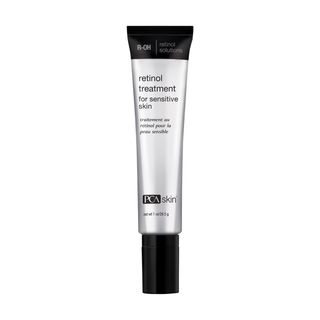
What the derm says: "I recommend any of PCA Skin's retinol solutions based on skin type, condition and Fitzpatrick type to minimize fine lines and wrinkles, improve skin surface, reduce discoloration, and even help clear breakouts," says Spann. "This formula for sensitive skin is a great entry point for new retinol users."
Hyaluronic Acid
Why it's an anti-aging superstar: "Hyaluronic acid is a major component of the body’s collagen, and it's a complex sugar molecule that can absorb 1000 times its weight in water," shares Devgan. "Used regularly in your skincare routine, it results in a dewy, hydrated, flawless-looking complexion reminiscent of that coveted 'glass skin' look."
How to use it like a pro: Hyaluronic acid is safe to use daily, is well-tolerated, and while you can use it both morning and night, Devgan says it's especially strategic in the morning as it adequately hydrates your skin for the day, and other products like SPF and/or makeup can be effortlessly layered ontop.
Helpful hint: "There are so many hyaluronic serums on the market, and one thing I always say is that not all hyaluronic acids are created equally," warns Devgan. "A mixed molecular weight hyaluronic has small fragments that will more effectively penetrate into the dermis to hydrate from within while the larger fragments reside on top of the skin to create a beautiful finish."
Shop the Best HA Products
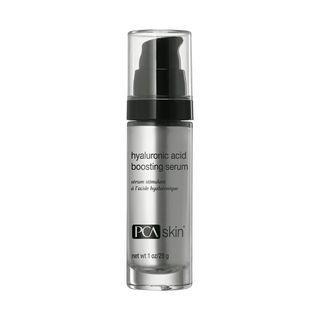
What the derm says: "This is my go-to for plumping and hydration maintenance for all my patients," notes Spann. "It effectively plumps, hydrates, and soothes all skin types, conditions, and types," says Fitzpatrick.
Astaxanthin
Why it's an anti-aging superstar: "Astaxanthin is a powerful, carotenoid antioxidant derived from microalgae," Rouleau tells us. "It helps rebuild collagen and protects tissues, cells, and membranes from destructive, free radicals which in effect, helps to reduce the look of wrinkles by encouraging smoother, youthful-looking skin. Astaxanthin is known to be one of the best active ingredients for preventative aging and is particularly beneficial for those who spend a lot of time outdoors and are regularly exposed to the elements."
How to use it like a pro: A powerful antioxidant, astaxanthin is usually found within serums and creams, and according to Rouleau, it's especially useful to apply it at nighttime before you log your beauty sleep. Apply your product as directed on the packaging, following your cleansing and toning ritual.
Shop the Best Astaxanthin Products
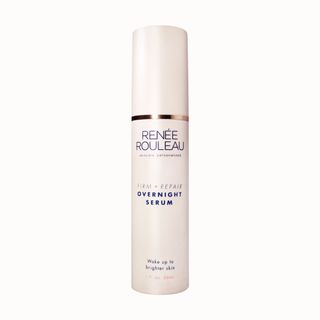
What the celeb facialist says: "I'm a big fan of incorporating astaxanthin as a nighttime serum to renew and replenish your skin while you sleep," says Rouleau. "After cleansing and toning, apply one pump to the entire face and follow with a nighttime moisturizer."
Niacinamide
Why it's an anti-aging superstar: "Niacinamide is a water-soluble form of vitamin B3 that boosts ceramide levels in the skin, improving the skin's ability to hold on to moisture," says Rouleau. "It works by stimulating circulation in the dermis through a process known as vasodilation, and it can reduce the yellow-ish look to the face caused by the glycation of proteins, which is a common visible effect of aging due to environmental damage. Niacinamide also serves as an antioxidant to protect cells, membranes, and tissues from free radical attacks and can even reduce discoloration (brown spots and post-breakout scars) by preventing the transfer of melanosomes from melanocytes to the keratinocytes. Lastly, niacinamide offers anti-breakout and anti-bacterial benefits to reduce blemish activity."
How to use it like a pro: Since niacinamide can be found in a variety of products (and you can safely apply it any time of the day), it's best to use your product as instructed.
Helpful hint: "While there are no known side effects associated with niacinamide, some people can experience some redness when using the ingredient in high percentages," notes Rouleau. She explains this is likely due to niacinamide's vasodilation process, therefore, you'll want to tread carefully and monitor your skin during the first few applications as you would with any other new addition to your routine.
Shop the Best Niacinamide Products
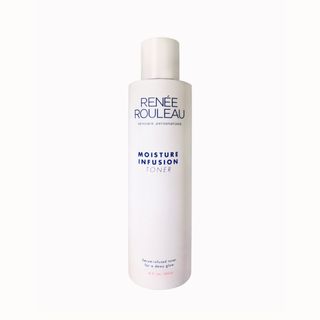
What the celeb facialist says: "I love this moisturizing toner with niacinamide," Rouleau explains. "After cleansing, wipe it over your face and leave it damp before proceeding with the next product in your routine. By leaving it damp on your face, it delivers moisture into the skin, and because the formula is water-based, it can act as a carrier for a serum applied afterward to be delivered deeper and more effectively to the skin."
Peptides
Why it's an anti-aging superstar: "Peptides are long or short chains of amino acids, which are the building blocks of protein that send signals to your cells to make more collagen and thicken the support structure of the skin," Rouleau explains. "Peptides are able to remain intact as they enter the skin's cells and they primarily function as moisture-binding agents. Plus, nearly all types of peptides have cell-communicating capabilities that send signals to the skin to repair itself. It's an especially strategic ingredient to incorporate if you're looking for firmer, more refined-looking skin."
According to Rouleau, the most beneficial types of peptides to look for within your products include palmitoyl tripeptide-38 (one of the most well-researched peptides on the market), palmitoyl oligopeptide, palmitoyl tetrapeptide-7, acetyl hexapeptide, palmitoyl pentapeptide, dipeptide-2, and caprooyl tetrapeptide."
How to use it like a pro: Peptides can be used safely at any time of the day, so it's best to follow the directions your product provides.
Shop the Best Peptide Products
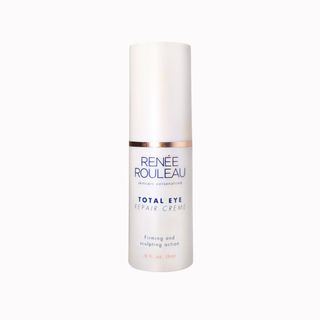
What the celeb facialist says: "Peptides are especially great for the eye area, and eye creams can be used both day or night," Rouleau shares. "Apply a thin layer around the outer corners of the eyes known as the 'crow’s feet' and be careful not to get it too close to the lashes, as you don’t want it to seep into your eyes."
Vitamin C
Why it's an anti-aging superstar: "Vitamin C is an important antioxidant that scavenges free radical and environmental damage that has compromised the skin," notes Devgan. "It helps to even out discoloration, fade brown spots, and improve lines."
How to use it like a pro: Citing data that suggests vitamin C may improve the absorption of retinol, Devgan recommends saving your daily dose of this potent anti-aging ingredient for the evening. Additionally, Robinson notes that while vitamin C is one of the best anti-aging ingredients for most skin types, those who are sensitive (again) should apply their formula at night and should start with lower concentrations. Then, once your skin has acclimated, or you know you're not having any reactions, he suggests graduating to twice-per-day (morning and night) applications and testing higher-dose formulas.
Helpful hint: "Vitamin C is an unstable ingredient, so look for stabilized versions," Robinson warns. BeautyStat's Universal C Skin Refiner has three patents due to its ability to stabilize pure vitamin C in a way where it won't oxidize—it stays pure and potent from the first drop to the last. You can use it morning and/or night, just be sure to follow it up with SPF if you opt for a morning application."
Shop the Best Vitamin C Products
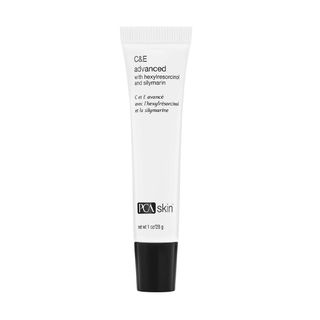
What the derm says: "One product I particularly like for my patients is PCA Skin's C&E Advanced," Spann shares. "It also provides additional antioxidant, anti-inflammatory, and discoloration-fighting ingredients silymarin and hexylresorcinol, and it's highly stable, effective, and contains calming ingredients that make it appropriate for a wide variety of patients to build collagen and even out skin tone."
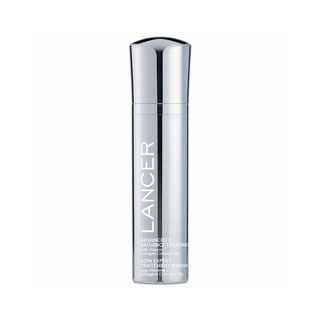
SPF
Why it's an anti-aging superstar: "When it comes to the best ingredients for anti-aging, number one always should be sun protection," clarifies Libby. "As a skin cancer surgeon, I love the saying, 'An ounce of prevention is worth a pound of cure.' I am seeing more and more young patients come in with skin cancers, either from a history of tanning bed use or an increase in recreational sun exposure. We are lucky that we now know how important and beneficial SPF is for both protection against UV damage (which can lead to skin cancers) as well as prevention against premature aging and unwanted pigmentation. Mineral-based sunscreens are my go-to, and the AAD recommends using a formula that has an SPF 30 or higher, is water-resistant, and boasts broad-spectrum protection against both UVA and UVB."
How to use it like a pro: According to Libby, a good rule of thumb is to apply your skincare products from thinnest to thickest. In the morning, after you cleanse, start with your serum, follow that with a moisturizer, and lastly, add your SPF.
Helpful hint: Even though any kind of SPF is better than nothing, Libby says she typically prefers mineral sunscreens as they are especially helpful for those who have sensitive skin, are pregnant, or who conditions like melasma.
Shop the Best SPF Products
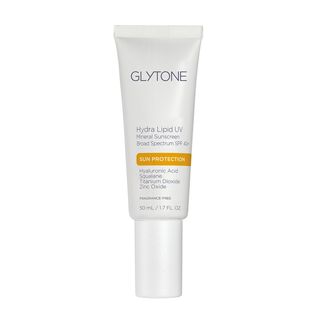
What the derm says: "One product I have been loving is Glytone's Hydra Lipid UV Mineral SPF 40+," Libby tells us. "It's formulated using a powerful antioxidant complex with vitamins C and E, as well as moisturizers like hyaluronic acid and squalane. It's the ultimate multitasking SPF."
Ceramides
Why it's an anti-aging superstar: "Ceramides are key components of the skin barrier, and when there aren't enough, skin conditions like eczema, dryness, and irritation can occur," Libby explains. "As we age, ceramide levels in our skin naturally decrease, and by the time we are 30, almost 40% of our skin’s ceramides are depleted, and by the time we are 40, that number increases to 60%. That said, we can help counteract this by adding them back into our skin to help re-fortify our skin's moisture barrier. When our skin is adequately moisturized and hydrated, it appears firmer, healthier, plumper, and overall less lined and wrinkled."
How to use it like a pro: Just like other ingredients like antioxidants, hyaluronic acid, etc., ceramides are safe to use for all and can be added to your regimen to help promote healthy skin and reverse any damage that has been done. You can find them in plenty of different formulas (typically creams) and it's recommended you follow the product's specific application protocol for best results.
Shop the Best Ceramide Products
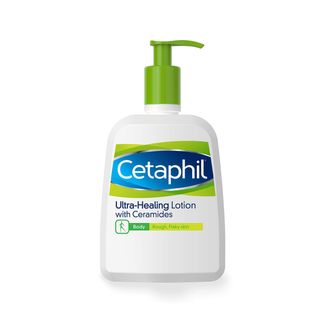
What the derm says: "I love using Cetaphil's Ultra-Healing Lotion which is packed with ceramides and other nourishing ingredients for my face and body," Libby shares. "I apply this immediately after the shower to help seal in moisture, and I find that it is rich enough to hydrate my skin in the winter while still being lightweight to use year-round as well."
What You Can Skip
Super-expensive moisturizers: According to Libby, there are plenty of affordably priced moisturizers on the market and there is actually little need to splurge. Of course, you can ultimately decide where you choose to invest within your skincare routine, but she recommends using your hard-earned dollars for antioxidant-containing formulas like your vitamin C products. (She notes that stable—aka, the most effective—vitamin C products, are harder to formulate and are therefore more expensive. Skinceuticals Phloretin CF $166 is her top recommendation.)
Products with ineffective ingredient proportions: Spann reveals that many skincare companies will tout that a product contains a particular ingredient, when in fact, there is a very small percentage of that ingredient in their formula. "It is important to be certain that key anti-aging ingredients are used at the levels at which they were tested for efficacy," she heeds. "Also, more isn't always better. There are ingredients—like peptides and hyaluronic acid—that are used at low percentages to achieve amazing results. Using more of something does not always indicate better outcomes."
Overexaggerated claims: As we talk about quite often on Who What Wear, it's always important to take marketing, product, and specific ingredient claims with a grain of salt. Because, as Devgan confirms, a lot of ingredients have overstated claims. She cites creams targeted toward stretch marks as one of the most likely offenders, and she's also wary of facial oils because while they may improve the barrier of the skin, their molecules are too large to truly hydrate the skin from within. Plus, she notes, they can also clog pores and lead to congestion. Last but not least, Devgan says large-fragment facial scrubs can be extremely rough and damaging to the skin texture, and chemical peels should be left to the professionals and not executed at home.
Next: Experts Reveal the 18 Best Skincare Brands to Unlock Plump,Youthful Skin
Erin has been writing a mix of beauty and wellness content for Who What Wear for over four years. Prior to that, she spent two and half years writing for Byrdie. She now calls Santa Monica home but grew up in Minnetonka, Minnesota, and studied writing, rhetoric, and communication at University of Wisconsin, La Crosse. She studied abroad in Galway, Ireland, and spent a summer in L.A. interning with the Byrdie and Who What Wear family. After graduating from UW, she spent one year in San Francisco, where she worked as a writer for Pottery Barn Kids and PBteen before moving down to L.A. to begin her career as a beauty editor. She considers her day-to-day beauty aesthetic very low-maintenance and relies on staples like clear brow serum (from Kimiko!), Lawless's Lip Plumping Mask in Cherry Vanilla, and an eyelash curler. For special occasions or days when she's taking more meetings or has an event, she'll wear anything and everything from Charlotte Tilbury (the foundations are game-changing), some shimmer on her lids (Stila and Róen do it best), and a few coats of the best mascara-type product on earth, Surratt's Noir Lash Tint.
-
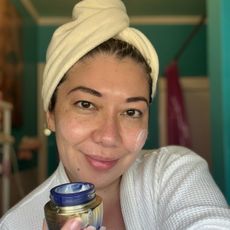 This Hero Japanese Skincare Ingredient Transformed My Dry, Perimenopausal Skin
This Hero Japanese Skincare Ingredient Transformed My Dry, Perimenopausal SkinI'm obsessed.
By Marie Lodi
-
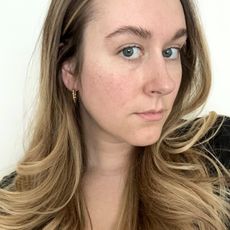 I'm 28, But My Neck Looks Way Older: I Asked 2 Derms What to Do About It
I'm 28, But My Neck Looks Way Older: I Asked 2 Derms What to Do About ItOperation "reverse-age my neck" has commenced.
By Kaitlyn McLintock
-
 An Expert Told Me This Cutting-Edge Molecule Is the Key to Visibly Youthful Skin
An Expert Told Me This Cutting-Edge Molecule Is the Key to Visibly Youthful SkinIt also gives you a serious glow.
By Shawna Hudson
-
 This Buzzy Noninvasive Treatment Can Smooth Fine Lines as Well as Botox
This Buzzy Noninvasive Treatment Can Smooth Fine Lines as Well as BotoxIt's definitely worth trying.
By Shawna Hudson
-
 I Just Turned 30—Here Are the Anti-Aging Products I Added Into My Beauty Routine
I Just Turned 30—Here Are the Anti-Aging Products I Added Into My Beauty RoutineI'm talking about at-home lasers, peels, and more.
By Valeriya Chupinina
-
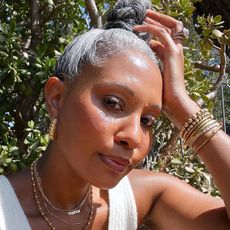 A Makeup Artist Says These 10 CC Creams Do the Most for Mature Skin
A Makeup Artist Says These 10 CC Creams Do the Most for Mature SkinYour skin will thank you.
By Maya Thomas
-
 14 Serums 40-Something Celebs Always Use (But Aren't Paid To)
14 Serums 40-Something Celebs Always Use (But Aren't Paid To)Serious sleuthing, here.
By Bianca Lambert
-
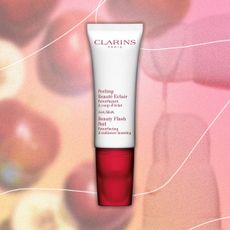 The New Face Mask Giving My Facialist a Run for Her Money
The New Face Mask Giving My Facialist a Run for Her MoneyPlus the other beauty products doing the most.
By Natalie Gray Herder
